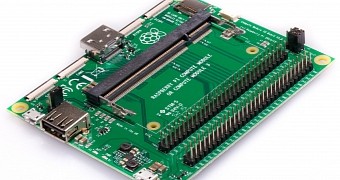Canonical, the company behind the popular Ubuntu Linux operating system, today announced that their Snappy-enabled Ubuntu Core OS is now available for Raspberry Pi Compute Module 3 (CM3).
Engineered as a micro-version of the Raspberry Pi 3 SBC, the Raspberry Pi Compute Module 3 (CM3) device was announced back in January to provide a general-purpose, cost-efficient and more simple single-board computer that can be easily slotted in and out of any device using a standard DDR2 SODIMM connector.
Starting today, Canonical and Raspberry Pi Foundation are announcing the official availability of the Ubuntu Core operating system, a barebone version of Ubuntu Linux designed for deployment in embedded and IoT (Internet of Things) devices of all sizes and shapes.
"Gaining official support for Ubuntu Core is highly significant for our Compute Module 3. It opens up a huge community of developers keen to leverage Ubuntu’s particular advantages in the IoT world; its resource-efficient footprint, versatility, and industry leading security benefits," says Eben Upton, CEO at Raspberry Pi.
Technical specifications of Raspberry Pi Compute Module 3 (CM3)
For those not familiar with Raspberry Pi Compute Module 3 (CM3)'s technical specifications, the board is powered by Raspberry Pi 3’s BCM2837 processor, uses 1GB RAM, and ships with a 4GB eMMC Flash storage device that's connected directly to the CPU. However, it doesn't offer built-in Wi-Fi connectivity.
There's also a light version, Raspberry Pi Compute Module 3 Lite (CM3L), which brings the SD card interface to the module pins to allow users to connect an SD card or eMMC flash storage device. With Ubuntu Core installed on them, these SBCs give device manufacturers a cost-effective route to produce fully-featured devices.
Ubuntu Core is backed by Canonical's Snappy technologies by default, which means that the functionality of the software installed on these devices can be easily upgraded through Snaps, the universal Linux application packaging format. Additionally, it lets device manufacturers construct their own app stores.

 14 DAY TRIAL //
14 DAY TRIAL //